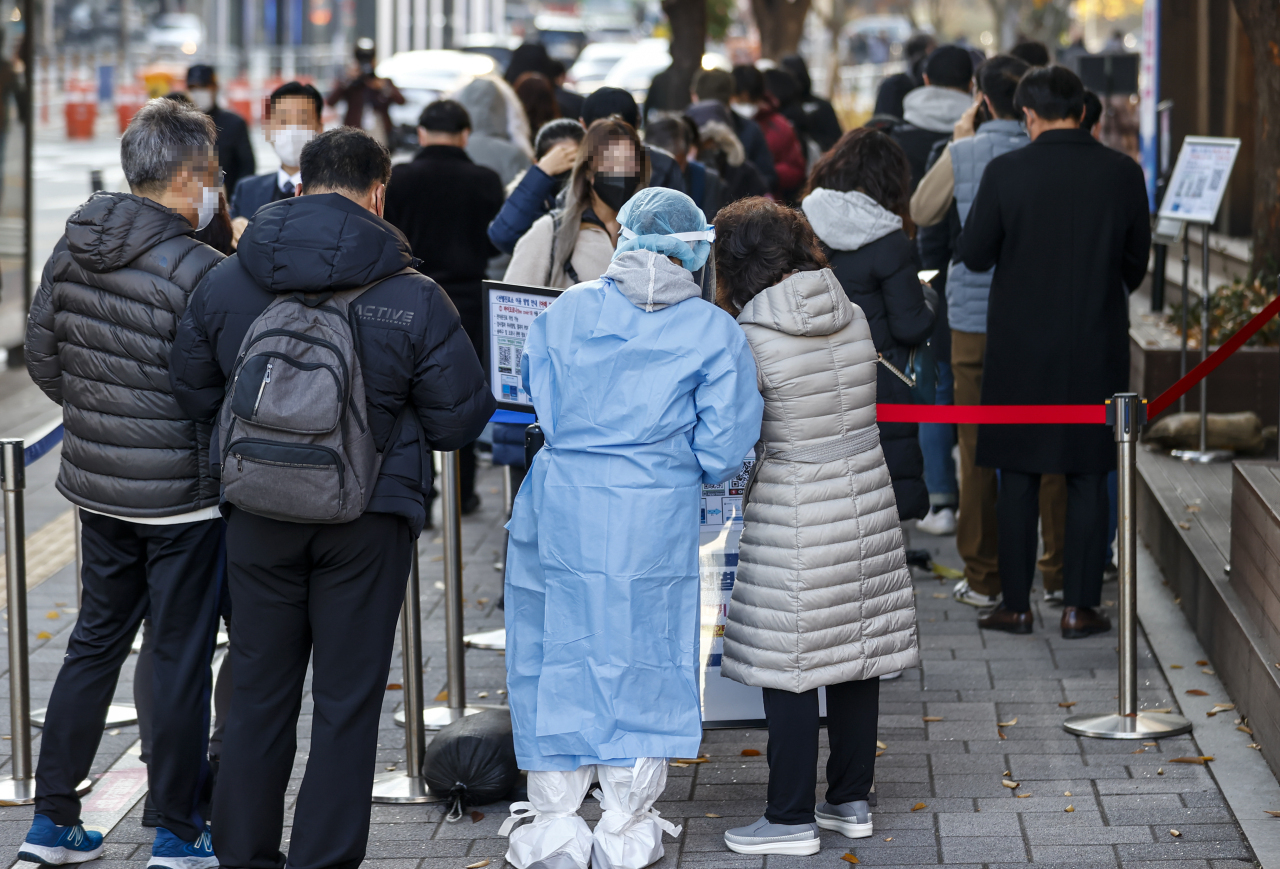 |
People stand in line to receive coronavirus tests at a screening clinic in southeastern Seoul on Wednesday. (Yonhap) |
South Korea will shorten the wait for COVID-19 booster shots as the daily count of new cases rose above 3,000 and breakthrough infections continued to send people to hospitals.
Prime Minister Kim Boo-kyum told a government meeting on Wednesday that the six-month wait for a booster will now be cut to four months for people who are older than 60 and residents of long-term care facilities. People aged 50 and up will be eligible for booster doses five months after their primary vaccine series.
He said as a result of the Wednesday decision to offer booster doses earlier, more than 13 million people will receive an extra vaccination against COVID-19 before the end of the year.
Health officials blame recent upticks in hospitalizations and deaths on the higher proportion of older patients as the country phases out its restrictions in a bid to return to normal. In the first of the three phases, which started Nov. 1 and is set to last three months, Korea lifted most curfews for high-risk businesses as well as other restrictions.
On Tuesday afternoon, for the fifth time in the past two weeks, the number of patients nationwide with severe or critical COVID-19 set a record: 522 people and 62 intensive care beds. On the same day 3,184 more cases were confirmed, the second-highest number seen in a single day. The highest was Sept. 25, when it was 3,270.
According to the official statistics, only about 8 percent of people in their 60s and above in Korea are unvaccinated or partly vaccinated, but they made up more than 61 percent of all 452 deaths reported between Oct. 3 and Nov. 6.
Breakthrough infections were also most commonly reported in people in their 80s and older, with 0.183 percent of fully vaccinated people in that age cohort having tested positive. Of the 35 million people in Korea who were fully vaccinated as of Nov. 7, breakthrough infections were reported in 0.099 percent.
The rollout of booster vaccinations, which began a month ago with front-line workers and older adults, has been extended to over-50s starting this week. Since then only about 432,000 people 60 and older have gotten a booster, with experts calling for them to be made available at a faster pace.
Although Korea’s health officials have said targeted protection of older adults is a better solution than bringing back restrictions for all of society, infectious disease expert Dr. Kim Woo-joo said measures are being implemented too slowly.
Since August, outbreaks have been affecting nursing homes despite a high vaccination of over 90 percent among both residents and workers. As of 5 p.m. Monday at least 30 homes for seniors were put under what is known as “cohort isolation,” in which all those at a given institution are barred from leaving because of an outbreak.
Kim, a professor at Korea University’s infectious disease department, pointed out that while boosters were not getting as quickly to vulnerable groups that need them, vaccination clinics across the country were closing down and vaccines were being discarded unused.
The shorter wait is also expected to close the awkward gap for 60- to 74-year-olds, most of whom received the second of their two AstraZeneca doses in August or September, administered 11 to 12 weeks after the first. Under the previous schedule, people in this age group would have had to wait until early next year to become eligible for boosters.
Since the pandemic began 402,775 people here have been confirmed to have COVID-19, of whom 3,158 have died.
By Kim Arin (
arin@heraldcorp.com)







![[Today’s K-pop] Blackpink’s Jennie, Lisa invited to Coachella as solo acts](http://res.heraldm.com/phpwas/restmb_idxmake.php?idx=644&simg=/content/image/2024/11/21/20241121050099_0.jpg)
